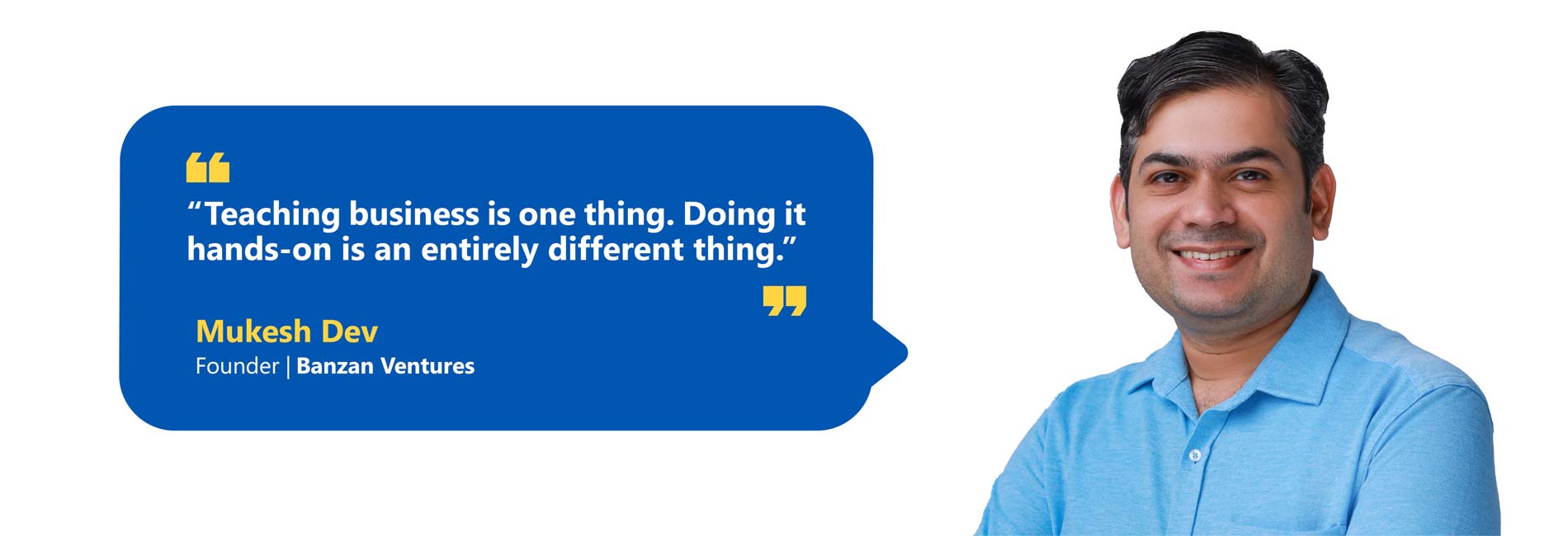
Banzan Ventures- A 3x Failed Entrepreneur's Persistence to Create a Legacy!
“Teaching business is one thing. Doing it hands-on is an entirely different thing.”
Founder, Banzan Ventures
On Being an ‘Unlearner, Unthinker & Unentrepreneur’
Embracing being a thrice failed start-up entrepreneur might not be everyone’s cup of tea, but Mukesh Dev is someone who sips every last drop of it. Every failure he has faced on his journey of entrepreneurship so far only fuelled him with a deeper resolve to succeed. Thus began his path of unlearning what he came to learn so far, unthinking what he has been conditioned to think regarding how a business should be run—contributing to becoming an ‘unentrepreneur’ of sorts.
“I believe that the projects failed—not me. I learnt from them and that learning has been immense. I have learnt far more from my five years of entrepreneurial failures than fifteen years of my corporate career,” Mukesh Dev admits. “That way, it has been far better and more satisfying. I still can’t picture myself going back to a cliched world of employment
His Professional Story So Far
Following the most trodden route of every middle class Commerce graduate, Dev went on to do his MBA, which he followed up with a professional ACS programme. He stepped into his professional journey in the Telecom sector before heading into the Banking and Financial Services Industry for a comparatively longer stint.
He was always interested in education and he is one to believe that the system needs a visceral change, not just topical modifications. This reimagination pushed him to take a complete career U-turn, to enter academics. He began to imagine a life for himself as a PhD scholar, becoming an author and a lecturer to bring in that ‘change’.
“I thought let us try to teach the next generation to be better corporate professionals. I am more of a hands-on person. I make my own judgement; I do my own research. And most times it works, sometimes, it does not.” Dev says of himself.
During his experience with teaching in a Tier-1 as well as a Tier-3 B-schools, he came face-to-face with a harsh reality- nothing was going to change in academia because one man wants to do something; and honestly, not many want a change. Even if they do, the ecosystem does not let them.
One thing his experience as a teacher gave him, though, was an exposure to entrepreneurship and start-up culture. Mukesh says, “I am thankful to my employer in Coimbatore and that city for igniting that bug in me.”
“Teaching business is one thing. Doing it hands-on is an entirely different thing,” Dev reflects. This pushed him to get the engines started on his first start-up idea. He was in search of something that would not require him to leave his job in hand initially, in line with his family’s middle-class sensibilities. He remembers having a journal with 18+ ideas penned down- all he needed to proceed were partners and a team. However, moonlighting did not quite take-off. “I’m not someone who could be committed to two occupations simultaneously,” he says of when he decided to take the plunge into entrepreneurship.
Three Entrepreneurial Journeys & Lessons Learnt
The process of convincing his family to take a break from employment to venture out into the entrepreneurial world took him a year and in 2015, he began. His pilot big idea, The Bulb Hub, was nipped in the bud before it could bloom but he hopes to pivot back to this ambitious idea at a later stage.
1. His first formal venture, Supernative, was one in the e-commerce domain set up in collaboration with two other first-generation entrepreneurs like Dev. It was set up in hopes of becoming an encyclopedia of sorts for Indian traditional arts and crafts. It was all about putting arts and crafts that were ‘truly Indian’ in the spotlight- those that were centuries old, passed on from generation to generation. Supernative was a platform to showcase the art and the artist and allow them to make better returns without having a money-hungry intermediary in the process. The website was built from scratch- documenting the lives and work of the artists across eight states. He attributes a few reasons to Supernative not working as well as its potential- the time delay between an order placement and product delivery due to lack of warehousing facilities and solely targeting an Indian market to sell the handmade products. Two years down the line, the other co-founders believed that the time and effort put in were not proportional to the returns coming in- and Dev knew he couldn’t run it alone.
2. Education is a domain that fascinated Mukesh throughout so he thought it best to have his second venture into entrepreneurship centred around it. The plan for ‘thoughtskool’ was to set up a venture that focused on upskilling- in a slightly unconventional manner.
3. The cascade of his second venture led him back to conducting workshops which allowed Dev to interact with several like-minded individuals. Being in the education field, he came across another individual who was in a similar place trying to upscale his mobile gaming idea. They decided to collaborate and co-found Hapiens Digital. The idea was to create a mobile game that was a synergy of Education, Entertainment and Empowerment- created for the masses. The process of creating the game took longer than expected and it dragged on till March 2020, when just the beta version had been created. Unfortunately, that is when COVID-19 hit, impacting funding to a great extent and subsequently shelving its release. They found themselves at crossroads- should the idea be pursued further while struggling to survive through the pandemic or was calling it quits a better option? Dev decided to choose the latter.

The initial idea following this five-year long hattrick of misfortune was to take a break. However, the insistence of four of his former team members forced Dev to think of the next big thing. He believed that he was at a point in his life with nothing to lose and nowhere to go but up; which pushed him to start Banzan Ventures mid-pandemic.

The Becoming of Banzan Ventures
Banzan Ventures was not born of a formal idea like any of Dev’s previous start-ups. He says, “The idea this time around was not to waste time in long-term planning and create a perfect launch. We are working on creating an above-average product that convinces us and users. We want to reach the user as quickly as possible and collect feedback from them to improve.”
It started off with four members volunteering their help and skill sets through the pandemic, eager to learn and work alongside Dev. “This is the confidence that they gave me. We are with you, they said. Even if there is no salary, we will be there. That’s how we started,” Mukesh says of his current team. “I am yet to find another company founder in my network whose team members told them that they will work without salaries for a few months, voluntarily.”
Dev put together possible ideas that could make the most of this combination of skills. He finally decided to reawaken and give a democratic makeover to a former Facebook meme persona he had called Baba Aam Dev. The idea was to create a comic modelled on RK Laxman’s Common Man that would appeal to the large masses, while still being unique in itself. Thus, a Buddhist Monk called BaBlah was born. This even corroborated with the company’s Buddhist name and everything seemed to fall in place.
Making mistakes is a welcome part of the process with his team- they are deemed okay to commit, Dev believes in embracing them and learning from them. The success of the comic led the team to consider scaling up. They have already made rapid strides on this front with the launch of a couple of games alongside the daily comic, with plans of a few more products in the pipeline by March 2021. The first game with this character, the BaBlah game is already available on Play Store for Android users to play! The intention is to garner users across the products launched and then create a character-driven entertainment company on the lines of Talking Tom or Chhota Bheem. With the comic and the games, the intention is to entertain the audience in a wholesome manner with adopting a rather open-minded approach.
The team brainstorms the daily comics and have explored a variety of themes from facts to vocabulary to Indian festivals to more contemporary topics like online shopping too. BaBlah started off as a daily comic on Instagram and within a few months, BaBlah’s wisdom has already garnered the interest of 7500+ followers from across the globe.
Being in the entertainment domain, Mukesh says, “We want it to be fun for everybody. Entertainment must be fun for the people working on it too. I want my people to have fun when they work.” All the products have been well received by the public and Dev hopes that future products will continue to receive the same love too!
When asked what has been the biggest achievement for Banzan Ventures so far, Mukesh puts it simply by saying, “Five men started with zero ideas and zero money. In five months, we had three running products and two prototypes in the making. I’m yet to see any other startup, at least in my network, that has been able to do that especially during the pandemic!” Now, Banzan Ventures has support not only from the current and former team, old investors of Dev’s previous startups have also chipped in and are actively contributing in their own limited ways to build up the brand.
Dev’s advice for aspiring entrepreneurs is quite different from what you may hear from others. He says, “Aim for success, but be prepared for disaster all the time. Focus on enjoying the process rather than constantly worrying about the outcome.” The unentrepreneur epithet got Dev into a league disparate from business owners who deem themselves visionaries and entrepreneurs, taking away from the pressure to succeed but setting him on a similar path. It was about re-learning the ropes with the abundance of lessons learnt from previous failures, while actually focusing on enjoying the journey.
